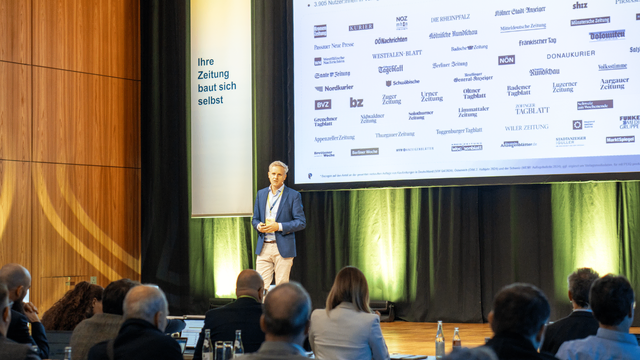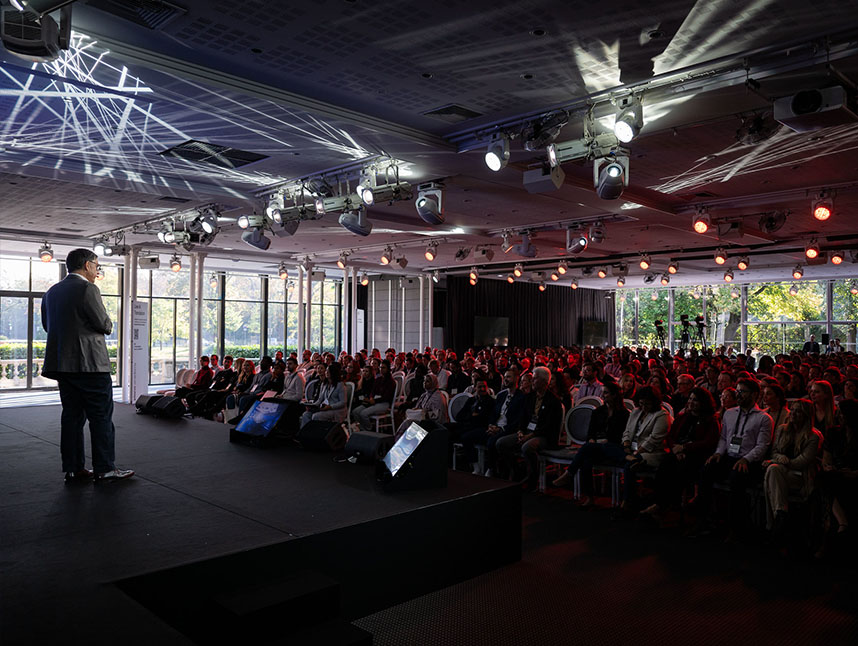How publishers are using AI to increase productivity — and where there is still potential
Generative AI continues to transform the media industry, enabling not only more efficient processes but also new business models. The AI Maturity Report 2024 provides valuable insights into the current state of AI-supported content creation in German publishing houses.
The media industry is currently in a phase in which artificial intelligence is being used primarily to increase efficiency and optimization. The tools rationalize and improve established editorial processes, especially for repetitive tasks that can be carried out more efficiently.
According to the AI Maturity Report 2024, compiled by the German Association of Digital Publishers and Newspaper Publishers in collaboration with Retresco, generative AI is already largely established in German media companies. 85% of the publishers surveyed actively use the technology and 13% plan to use it in the future. Nevertheless, the technology is not yet in widespread use - and the potential of generative AI remains untapped. This is clear from the fact that only 13% of respondents state that 51-100% of journalists in their newsroom use AI tools on a regular basis. The remaining respondents indicated a significantly lower level of use in their newsrooms.
German media use AI as a supporting tool
German media companies primarily use AI applications for text production, mainly as assistance in the creative area. However, the companies surveyed do not use AI for fully autonomous text production. One of the reasons for this is that the majority of people are skeptical about AI-generated content, according to the Reuters Digital News Report 2024. The insufficient quality of the output from AI tools is also a decisive factor for publishers.
The situation is similar for podcast production: only three percent of the companies surveyed have podcasts produced completely autonomously by AI and use the technology primarily as a tool. The reasons for this are the high quality requirements of journalism, the still limited reliability of the technology, technical limitations and ethical and legal concerns.
The combination of AI and human work, on the other hand, is proving promising for content creation. This is particularly evident in audio formats, which a third (34%) of the German media companies surveyed produce using AI to save time and resources. AI-based text-to-speech programs simplify the creation of news podcasts, for example: The prepared text is converted into speech by generative AI and spoken by an artificial voice.

At the Aachener Zeitung audio manager Peter Engels is currently solely responsible for the audio department. Thanks to AI-supported editing programs with sound optimization and transcription software, as well as support from the editorial team, the Aachener Zeitung can also successfully produce podcasts as a smaller medium. After two years of podcast production with AI, the reach is increasing and the first formats are already being financed by sponsors.
For the interview podcast "Alles gesagt" of the ZEIT generative AI made it possible to translate the format into German. The voices of hosts and guests were simulated, which enabled an additional episode to be produced in a resource-efficient manner and a new target group to be addressed.
Despite the simplification of work through AI editing, deviations such as voice distortions occasionally occur. This is why a review by the editors remains essential. As AI tools become increasingly reliable, the effort required for audio editing is reduced, leaving more time for the actual content creation. Generative AI enables smaller editorial teams to successfully produce podcasts, try out new formats and expand business models while saving resources.
Most important areas of application for generative AI for German media companies
For German media companies, the use of AI is currently particularly important in the areas of print layout, social media monitoring and idea generation (AI Maturity Report 2024). Print layout creation using generative AI is in first place, with 61% of the companies surveyed using it.
One example of this is the Nordwest-Zeitung, which uses generative AI to create a complete edition and even several editions in parallel within a few minutes. The AI completes an entire day's work in seconds with minimal post-editing effort. The NWZ can now use the freed-up staff for new projects and to strengthen other editorial areas. Thanks to automated page production, the Nordwest-Zeitung has thus achieved a considerable increase in efficiency.

Increased efficiency is a key effect of generative AI
German media companies have clear expectations of the use of AI. Almost all respondents (97%) agree that AI makes journalistic processes more efficient through automation and gives them additional freedom. In addition to time savings, 47% of companies also observe an improvement in content quality with generative AI.
German media also see AI technologies as having the potential to drive the development of new products and functions. By increasing the quantity of editorial content, publishers can create a more diverse offering. The use of generative AI is particularly important in the areas of image creation (87% of companies), research, audio production and text generation. The companies surveyed are predominantly positive about AI-driven changes, which underlines the central role that the technology will play in these areas in the future.
One example of increased efficiency through AI is the Frankfurter Allgemeine Zeitung. The FAZ uses generative AI to summarize articles in the news app. Previously, there were no resources to provide readers with summaries, but now subscribers receive the key messages in a compact four-point format. These AI-generated summaries are tagged and allow readers to provide feedback on errors. The function is appreciated by readers and helps to attract new Plus subscribers, explains product developer Martina Sorg in an interview with media service kress. With KI, FAZ offers its readers added value and saves valuable time at the same time.

The Hamburger Morgenpost is also benefiting from more efficient text creation workflows. The weekly newspaper uses Purple Prompts, the seamless AI integration in Purple's CMS, to automate repetitive tasks. Purple Prompts enables the editorial team to manage their own prompts and use them to efficiently rewrite texts or optimize proofreading, for example. Managing director and publisher Arist von Harpe reveals more about the transformation of his newspaper with the help of AI and digital technologies in this podcast.
OVB Media also works more efficiently with AI applications and saves 280 hours of time per month by using generative AI in the areas of social media, complaint management and Whatsapp assistant. BurdaForward uses AI to successfully manage 170 topic channels on WhatsApp - with just three employees - and generates two million page views per month on Focus Online, Chip, Bunte and more. An AI-assisted matchmaking tool analyzes the topic-specific posts of the respective channel and automatically suggests further articles from the BurdaForward range to the editorial team. With 231,000 subscribers, the most successful WhatsApp channel is Taylor Swift News - the more specific the range of topics covered by the channel, the more successful and higher the click rate.
Generative AI offers media companies the advantage of being able to handle a wide range of tasks in less time. This is particularly promising for regional and local newsrooms with limited resources. According to a report by Enders Analysis, AI enables smaller newsrooms in particular to complete a variety of tasks more efficiently. AI tools not only increase efficiency in repetitive processes, but are an essential building block for the future of newsrooms.
Unused potential of AI
The AI Maturity Report 2024 not only shows that AI is not yet being used across the board in German media companies, but also that there is untapped potential in many areas. Particularly little attention is paid to AI-supported personalization and SEO: 50 percent of respondents do not plan to use generative AI in these areas.
A successful example of AI-supported content personalization comes from the Kölner Stadt-Anzeiger. The newspaper relies on an AI-supported recommendation system based on collaborative filtering. This technology analyses user behaviour and recognizes the individual interests of readers. The use of this system on the KStA website and its sister portal EXPRESS led to an increase in the click rate of around 85 percent. In addition to greater user interaction, generative AI also relieves the burden on editors: as the manual curation of content is automated, editors can concentrate more on content creation, which leads to a significant increase in efficiency.

Challenges and opportunities of AI applications in German publishing houses
The AI Maturity Report 2024 shows that the use of AI varies greatly in German publishing houses. While some are already making intensive use of AI technologies, there is often a lack of human resources and technical expertise to exploit the full potential. It should be noted that the more it is used, the more positive the experience in the editorial offices. Regular use, at least weekly, increases the "AI maturity level" of employees and improves their skills in using the technology.
However, the widespread use of AI also poses challenges. Many publishers do not fully utilize generative AI, mostly due to knowledge gaps among employees. Other obstacles include so-called "AI hallucinations" (content distortions) and concerns about data protection and legal security. Readers' trust in AI-generated content also remains a critical issue. Continuous quality assurance is necessary to maintain credibility.
The majority of German media companies recognize the importance of generative AI for competitiveness: 87% of those surveyed are convinced that AI will strengthen their competitiveness and 79% plan to firmly integrate AI into their corporate strategy in the next twelve months. This shows that AI is no longer just seen as an experiment in German media, but as a productive tool. For many publishers, generative AI is already an integral part of everyday journalism.
The ongoing efficiency phase made possible by AI means more than just cost savings and increased efficiency for the industry. Artificial intelligence is increasingly seen as a tool for high-quality journalism - provided that media professionals have the necessary knowledge to use the technology in a meaningful way. It is crucial for publishers to identify suitable use cases and continuously experiment in order to maximize the benefits of generative AI. AI should become an integral part of publishers' corporate strategy so that media companies can exploit the full potential of this technology and secure their innovative strength in the long term. Publishers should therefore strengthen their AI skills in a targeted manner.
Do you have questions about the use of generative AI in your editorial department? Get in touch with usand we will be happy to help and advise you.






%201.svg)











